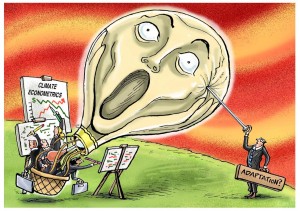Doomsday Climate Scenarios Are a Joke
< < Go Back
By Oren Cass,
One study says world GDP will drop 20% by 2100, but Iceland and Mongolia will be rich beyond imagining.
Debates over climate change are filled with dire estimates of its cost. This many trillions of dollars of damage, that large a share of gross domestic product destroyed, so-and-so many lives lost, etc. Where do such figures come from? Mostly from laughably bad economics.
This has nothing to do with the soundness of climate science. The games begin when economists get their hands on scientific projections and try to translate temperatures into human impacts. They conduct statistical analyses of the effects that small year-to-year temperature variations have on things like mortality and economic growth, and try to extrapolate to the effect of very large, slow shifts in underlying climate. This creates absurd estimates that ignore human society’s capacity for adaptation. This is the latest iteration of the same mistake environmental catastrophists seem insistent on making in every generation.
The best illustration lies deep in a 2015 paper published in Nature by professors from Stanford and the University of California, Berkeley. They found that warm countries tended to experience lower economic growth in abnormally warm years, while cold countries experienced higher growth in such years. Applying that relationship to a much warmer world of the future, they concluded that unmitigated climate change would likely reduce global GDP by more than 20% from what it otherwise would reach by century’s end.
That is roughly an order of magnitude higher than prior estimates, and it has received widespread media attention. But it is as preposterous as it is stunning.
Sadly, this paper represents the norm. Last fall the U.S. Government Accountability Office released a summary of existing research on future climate costs for the United States. As I show in a new report published by the Manhattan Institute, a small set of studies dominate this research. They reach their imposing dollar figures by refusing, like the Nature study, to consider how society will evolve and adapt.
More From The Wall Street Journal (subscription required):




